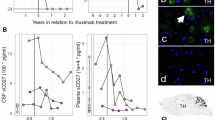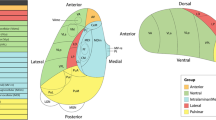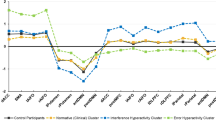Abstract
Many children with childhood-onset obsessive–compulsive disorder (OCD) fail to respond adequately to standard therapies. Evidence from preclinical and clinical studies suggests that the glutamatergic neurotransmitter system might be an alternative treatment target. This study examined the efficacy of riluzole, a glutamatergic modulator, as an adjunctive therapy for children with treatment-resistant OCD. In a 12-week, double-blind, placebo-controlled study, 60 treatment-resistant children and adolescents (mean age=14.5±2.4 years), with moderate to severe OCD (mean Children’s Yale-Brown Obsessive–Compulsive Scale (CY-BOCS)=28.2±3.7), 17 of whom also had concomitant autism spectrum disorder, were randomized to receive riluzole (final dose of 100 mg/day) or placebo in addition to the existing treatment regimen. Fifty-nine subjects completed the randomized trial. Primary outcome measures were changes on the CY-BOCS, the Clinical Global Impressions Scale, and the Children’s Global Assessment Scale. Riluzole was fairly well tolerated, although it was associated with one case of pancreatitis and five instances of slight increases in transaminases. All subjects showed significant reductions in CY-BOCS scores during treatment; however, there was no significant difference between placebo and riluzole on any of the primary or secondary outcome measures. The study failed to demonstrate superiority of riluzole over placebo as an adjunctive treatment for children with childhood-onset OCD. However, future studies may show benefits for less treatment-refractory children with fewer concomitant medications.
Similar content being viewed by others
Log in or create a free account to read this content
Gain free access to this article, as well as selected content from this journal and more on nature.com
or
References
Abramowitz JS, Whiteside SR, Deacon BJ (2005). The effectiveness of treatment for pediatric obsessive-compulsive disorder: a meta-analysis. Behav Ther 36: 55–63.
Arnold PD, Sicard T, Burroughs E, Richter MA, Kennedy JL (2006). Glutamate transporter gene SLC1A1 associated with obsessive-compulsive disorder. Arch Gen Psychiatry 63: 769–776.
Bellingham MC (2011). A review of the neural mechanisms of action and clinical efficiency of riluzole in treating amyotrophic lateral sclerosis: what have we learned in the last decade? CNS Neurosci Ther 17: 4–31.
Bodfish JW, Symons FJ, Parker DE, Lewis MH (2000). Varieties of repetitive behavior in autism: comparisons to mental retardation. J Autism Dev Disord 30: 237–243.
Cohen J (1988) Statistical Power Analysis for the Behavioral Sciences. Lawrence Erlbaum.
Dickel DE, Veenstra-VanderWeele J, Cox NJ, Wu X, Fischer DJ, Van Etten-Lee M et al (2006). Association testing of the positional and functional candidate gene SLC1A1/EAAC1 in early-onset obsessive-compulsive disorder. Arch Gen Psychiatry 63: 778–785.
Farmer C, Thurm A, Grant P (2013). Pharmacotherapy for the core symptoms in autistic disorder: current status of the research. Drugs 73: 303–314.
Geller DA (2006). Obsessive-compulsive and spectrum disorders in children and adolescents. Psychiatr Clin North Am 29: 353–370.
Geller DA, Biederman J, Stewart SE, Mullin B, Martin A, Spencer T et al (2003). Which SSRI? A meta-analysis of pharmacotherapy trials in pediatric obsessive-compulsive disorder. Am J Psychiatry 160: 1919–1928.
Grant P, Lougee L, Hirschtritt M, Swedo SE (2007). An open-label trial of riluzole, a glutamate antagonist, in children with treatment-resistant obsessive-compulsive disorder. J Child Adolesc Psychopharmacol 17: 761–767.
Guy W (1976). ECDEU Assessment manual for psychopharmacology. In US Department of Health E, and Welfare (ed) National Institute of Mental Health: Rockville, MD.
Helsel WJ, Matson JL (1984). The assessment of depression in children: the internal structure of the Child Depression Inventory (CDI). Behav Res Ther 22: 289–298.
Javitt DC, Schoepp D, Kalivas PW, Volkow ND, Zarate C, Merchant K et al (2011). Translating glutamate: from pathophysiology to treatment. Sci Transl Med 3: 102mr102.
Kaufman J, Birmaher B, Brent D, Rao U, Flynn C, Moreci P et al (1997). Schedule for Affective Disorders and Schizophrenia for School-Age Children-Present and Lifetime Version (K-SADS-PL): initial reliability and validity data. J Am Acad Child Adolesc Psychiatry 36: 980–988.
Liebowitz MR, Turner SM, Piacentini J, Beidel DC, Clarvit SR, Davies SO et al (2002). Fluoxetine in children and adolescents with OCD: a placebo-controlled trial. J Am Acad Child Adolesc Psychiatry 41: 1431–1438.
Lord C, Risi S, Lambrecht L, Cook EH Jr, Leventhal BL, DiLavore PC et al (2000). The autism diagnostic observation schedule-generic: a standard measure of social and communication deficits associated with the spectrum of autism. J Autism Dev Disord 30: 205–223.
Lord C, Rutter M, Le Couteur A (1994). Autism Diagnostic Interview-Revised: a revised version of a diagnostic interview for caregivers of individuals with possible pervasive developmental disorders. J Autism Dev Disord 24: 659–685.
MacMaster FP, O'Neill J, Rosenberg DR (2008). Brain imaging in pediatric obsessive-compulsive disorder. J Am Acad Child Adolesc Psychiatry 47: 1262–1272.
March JS, Biederman J, Wolkow R, Safferman A, Mardekian J, Cook EH et al (1998). Sertraline in children and adolescents with obsessive-compulsive disorder: a multicenter randomized controlled trial. JAMA 280: 1752–1756.
March JS, Parker JD, Sullivan K, Stallings P, Conners CK (1997). The Multidimensional Anxiety Scale for Children (MASC): factor structure, reliability, and validity. J Am Acad Child Adolesc Psychiatry 36: 554–565.
Menzies L, Chamberlain SR, Laird AR, Thelen SM, Sahakian BJ, Bullmore ET (2008). Integrating evidence from neuroimaging and neuropsychological studies of obsessive-compulsive disorder: the orbitofronto-striatal model revisited. Neurosci Biobehav Rev 32: 525–549.
Micali N, Heyman I, Perez M, Hilton K, Nakatani E, Turner C et al (2010). Long-term outcomes of obsessive-compulsive disorder: follow-up of 142 children and adolescents. Br J Psychiatry 197: 128–134.
Pediatric OCD Treatment Study (2004). Cognitive-behavior therapy, sertraline, and their combination for children and adolescents with obsessive-compulsive disorder: the Pediatric OCD Treatment Study (POTS) randomized controlled trial. JAMA 292: 1969–1976.
Riddle MA, Reeve EA, Yaryura-Tobias JA, Yang HM, Claghorn JL, Gaffney G et al (2001). Fluvoxamine for children and adolescents with obsessive-compulsive disorder: a randomized, controlled, multicenter trial. J Am Acad Child Adolescent Psychiatry 40: 222–229.
Rosenberg DR, MacMaster FP, Keshavan MS, Fitzgerald KD, Stewart CM, Moore GJ (2000). Decrease in caudate glutamatergic concentrations in pediatric obsessive-compulsive disorder patients taking paroxetine. J Am Acad Child Adolesc Psychiatry 39: 1096–1103.
Scahill L, Riddle MA, McSwiggin-Hardin M, Ort SI, King RA, Goodman WK et al (1997). Children's Yale-Brown Obsessive Compulsive Scale: reliability and validity. J Am Acad Child Adolesc Psychiatry 36: 844–852.
Shaffer D, Gould MS, Brasic J, Ambrosini P, Fisher P, Bird H et al (1983). A children's global assessment scale (CGAS). Arch Gen Psychiatry 40: 1228–1231.
Stewart SE, Geller DA, Jenike M, Pauls D, Shaw D, Mullin B et al (2004). Long-term outcome of pediatric obsessive-compulsive disorder: a meta-analysis and qualitative review of the literature. Acta Psychiatrica Scandinavica 110: 4–13.
Watson HJ, Rees CS (2008). Meta-analysis of randomized, controlled treatment trials for pediatric obsessive-compulsive disorder. J Child Psychol Psychiatry 49: 489–498.
Wink LK, Erickson CA, Stigler KA, McDougle CJ (2011). Riluzole in autistic disorder. J Child Adolesc Psychopharmacol 21: 375–379.
Wu K, Hanna GL, Rosenberg DR, Arnold PD (2012). The role of glutamate signaling in the pathogenesis and treatment of obsessive-compulsive disorder. Pharmacol Biochem Behav 100: 726–735.
Zarate CA, Manji HK (2008). Riluzole in psychiatry: a systematic review of the literature. Expert Opin Drug Metab Toxicol 4: 1223–1234.
Acknowledgements
This research (protocol 05-M-0225) was supported by the Intramural Program of the National Institute of Mental Health (NIMH) of the National Institutes of Health (NIH; Grant # 1ZIAMH002913). ClinicalTrials.gov identifier NCF00251303.
Author information
Authors and Affiliations
Corresponding author
PowerPoint slides
Rights and permissions
About this article
Cite this article
Grant, P., Joseph, L., Farmer, C. et al. 12-Week, Placebo-Controlled Trial of Add-on Riluzole in the Treatment of Childhood-Onset Obsessive–Compulsive Disorder. Neuropsychopharmacol 39, 1453–1459 (2014). https://doi.org/10.1038/npp.2013.343
Received:
Revised:
Accepted:
Published:
Issue date:
DOI: https://doi.org/10.1038/npp.2013.343
Keywords
This article is cited by
-
Pediatric Treatment-Resistant Obsessive Compulsive Disorder: Treatment Options and Challenges
Pediatric Drugs (2024)
-
A perspective on molecular signalling dysfunction, its clinical relevance and therapeutics in autism spectrum disorder
Experimental Brain Research (2022)
-
A Randomized Placebo-Controlled Cross-Over Pilot Study of Riluzole for Drug-Refractory Irritability in Autism Spectrum Disorder
Journal of Autism and Developmental Disorders (2018)
-
Aripiprazole and Riluzole treatment alters behavior and neurometabolites in young ADHD rats: a longitudinal 1H-NMR spectroscopy study at 11.7T
Translational Psychiatry (2017)
-
Evidence-Based Treatments in Treatment-Naïve and Treatment-Resistant Pediatric Obsessive-Compulsive Disorder
Current Behavioral Neuroscience Reports (2015)



